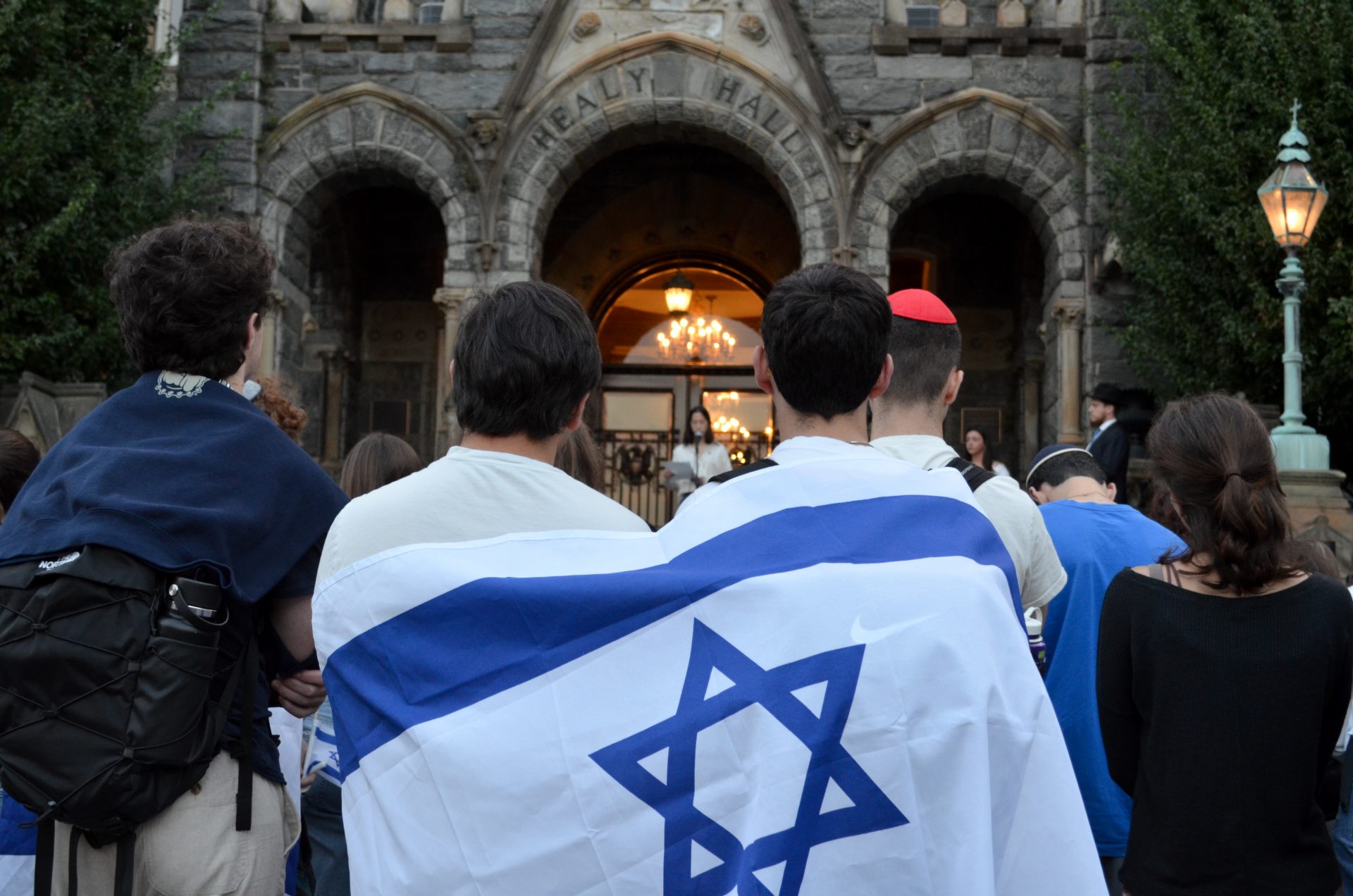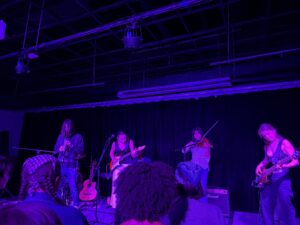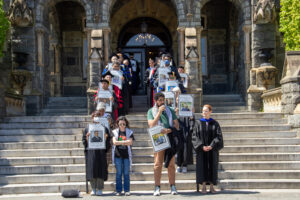On Oct. 7, 2023, Talia Zamir (CAS ’26) scrambled to contact her family as she watched the fallout of Hamas’ attack on Israel while in D.C. Zamir is Israeli-American and has friends and family living in Israel.
“It was a frantic set of calls to my family in Israel, who observed Shabbat and who were not on their phones,” Zamir, co-president of Georgetown’s Jewish Student Association (JSA), said at a Yizkor Memorial Service on the one-year anniversary of the attack.
“I felt like my world was on fire as I watched in horror as bodies laid on the roads that I had driven on my whole life,” Zamir said.
Zamir also spoke at a student-led memorial hosted by the Georgetown Israel Alliance (GIA) the evening of Oct. 7, 2024 on the Healy Steps. Over 70 students attended. The public memorial directly followed the Yizkor Memorial Service held by Georgetown Jewish Life in Gaston Hall.
At the Yizkor service, Zamir reflected on the past year, and said she still struggles to come to terms with the loss of life that occurred that day and since.
“The anguish I felt, and I feel, is difficult to articulate. I struggle to find the words, even one year later,” Zamir said. “I am awash in the pain of mothers who lost their children and partners who buried their loved ones weeks before their wedding days. I grieve the joy and potential and love that was stolen from us, and I grieve for my friends and family who no longer feel safe, who feel betrayed by a government whose role is to protect them.”
In the Oct. 7, 2023 attack, Hamas killed 1,200 people, including residents of kibbutzes, small Israeli towns centered around collective farms, and attendees of the Nova Music Festival along the Gaza border. Hamas militants took another 250 people hostage into Gaza that day. Of those taken hostage, 101 remain in captivity, and the Israeli government estimates that one third of this number are dead.
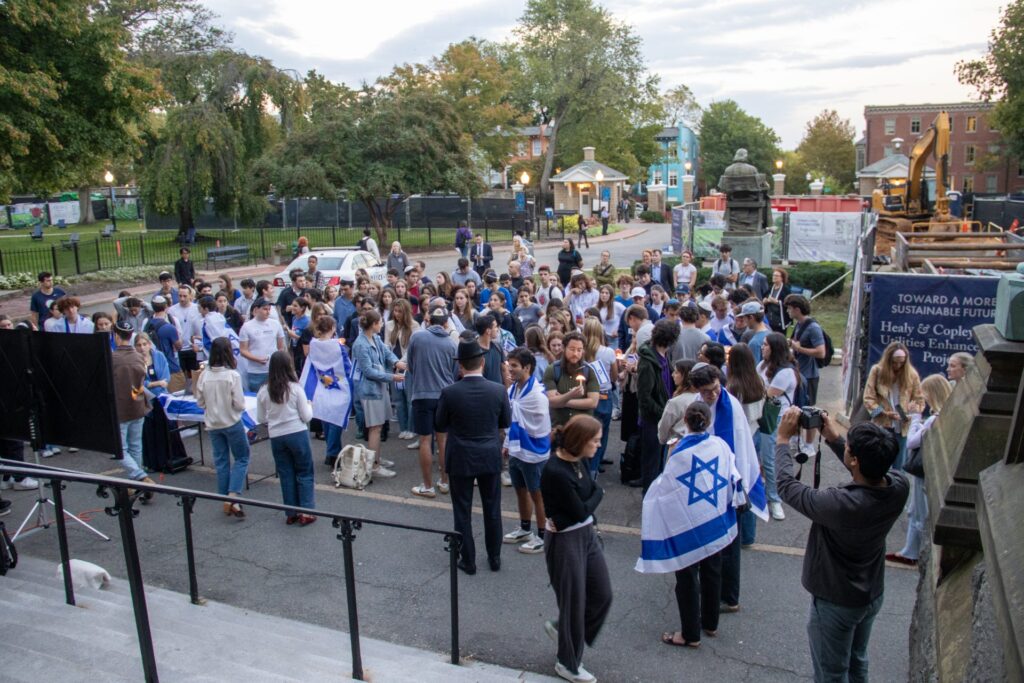 Photo by Connor Martin
Photo by Connor Martin
Since then, Israel has killed over 41,000 Palestinians, among them thousands of civilians, through its ground invasion and bombardment of Gaza. This most recent escalation is part of a conflict over land that has been ongoing since before the establishment of the Israeli state in 1948, which led to the displacement of at least 700,000 Palestinians.
After Hamas’ military takeover of Gaza in 2007, Israel blockaded Gaza, limiting how goods can enter the territory and how Palestinians can move between Gaza and Israel, effectively isolating the strip from the rest of the occupied Palestinian territories and the world. The blockade imposed limited access to water, food, education, and medical care for Palestinians, which has been exacerbated by Israel’s recent bombardment.
At the Yizkor memorial service, both Zamir and Jonathan Lincoln, director of Georgetown’s Center for Jewish Civilization, spoke on the tragedy and civilian death that has precipitated since the Hamas attack.
“Hamas’ attack on October 7 also unleashed an unprecedented wave of violence, which today affects millions across the Middle East,” Lincoln said. “This includes the unrivaled levels of death and destruction for Palestinians in Gaza, with no clear end in sight.”
Zamir echoed Lincoln’s words and said that she prays for peace—for everyone.
“I pray and I scream with my people for the safe return of the 101 hostages and an end to this war, a war which has taken the lives of too many innocent Israelis and Palestinians,” she said.
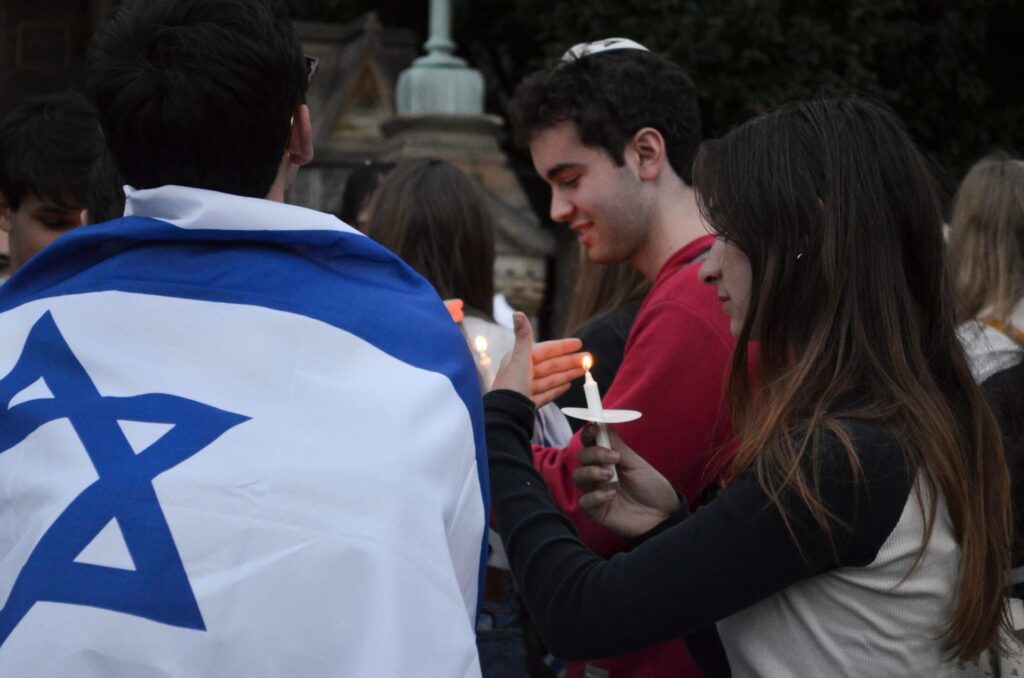 Photo by Sabrina Shaffer
Photo by Sabrina Shaffer
Throughout the student-led memorial after the service, speakers emphasized that although the attack was one year ago, these feelings of grief are ongoing.
“I believe that referring to this tragedy by the ‘day on which it began’ does an immense disservice to our people and our experiences,” Naama Ben-Dor (CAS ’26), president of GIA, said. “Referring to our tragedy as October 7th, convinces the rest of the world that the nightmare ended with October 8th.”
Ben-Dor also shared her thoughts on the ongoing invasions Israel is waging. The memorial included prayers for the remaining hostages and to keep Israeli soldiers in Gaza and Lebanon safe.
“We’ve lost 724 soldiers, officers, and reservists since then, fighting to protect our country in the face of a war that it did not begin,” Ben-Dor said. “Every passing week, we face the debilitating fear of not knowing with certainty whether brothers, sisters, and friends will return home when called to duty.”
Each of the speakers at the memorial shared a story about someone they lost in the Oct. 7 attack or soldiers who had been killed during the course of Israel’s invasions in Gaza and, more recently, Lebanon. During these stories, attendees held each other and wept.
Zamir read a letter from Darya Rozen about Rozen’s friend Ayelet Arnin, an Israeli reporter. Hamas killed Arnin at the Nova Music Festival on Oct. 7.
“Ayelet was the kindest person I know,” Zamir said. “She believed in peace, in people. She was the complete opposite of the monsters who killed her. Despite the awful way she was taken from us, we choose to remember our beautiful Ayelet. For her life, and not for death.”
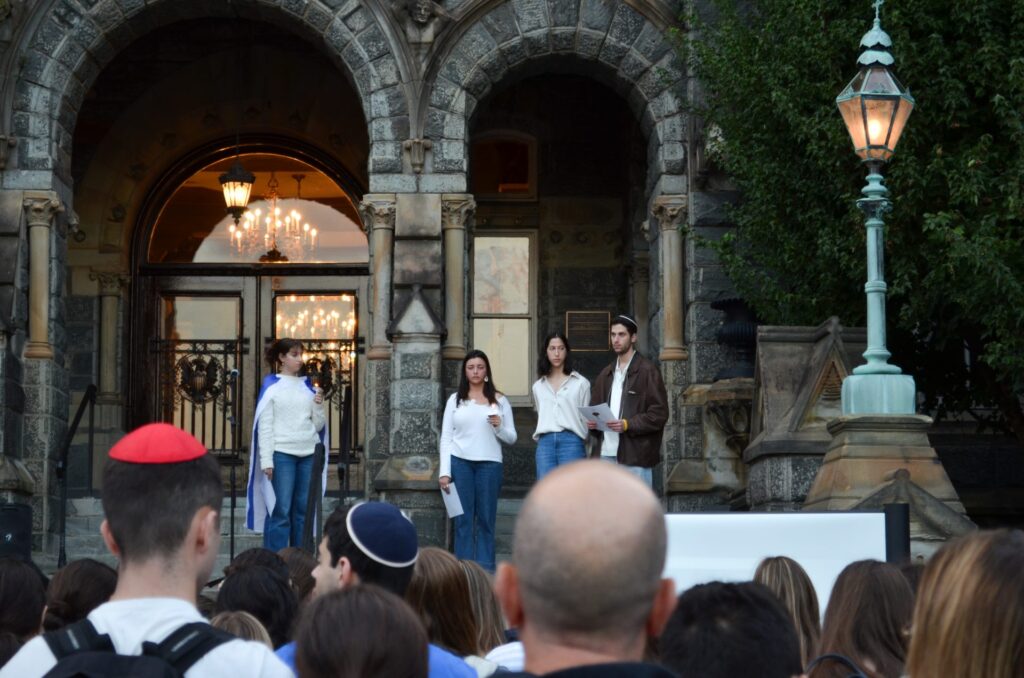 Photo by Franziska Wild
Photo by Franziska Wild
Part of what is painful for some Georgetown students about this anniversary is the distance from home. Shira Oz (SFS ’28), an international student from Israel, shared with the Voice how she’s been grieving and processing.
“It sucks. It definitely sucks, I think for any Israeli, if you open Instagram right now, it’s just a lot,” Oz said in an interview to the Voice. “I looked at all the videos that were being uploaded and read all the quotes of people marking the year to their best friend or parent or son’s death.”
During the Yizkor service, Georgetown Rabbi Ilana Zietman led community members in a Mourner’s Kaddish, a traditional Jewish prayer to honor a dead loved one. In her speech at the service, Zietman encouraged students to use the day to come together and reflect, but also to go forward to work towards peace, with pride in their Judaism.
“This anniversary, especially, which is right in between Rosh Hashanah and Yom Kippur, is an opportunity to not only reflect on where we’ve been, but also to reflect on where we want to go, individually and communally,” Zietman said. “My ask is that we not allow our despair to make us complacent or resentful. We are better than that.”
As the ceremony came to a close, Zietman read “Prayer of the Mothers,” written by Israeli Rabbi Tamar Elad-Applebaum and Palestinian Sheikha Ibtisam Mahameed, both mothers who co-wrote the prayer as a wish for peace and understanding.
“And with my tears and prayers which I pray / And with the tears of all women who deeply feel the pain of these difficult days / I raise my hands to you please / God have mercy on us.”
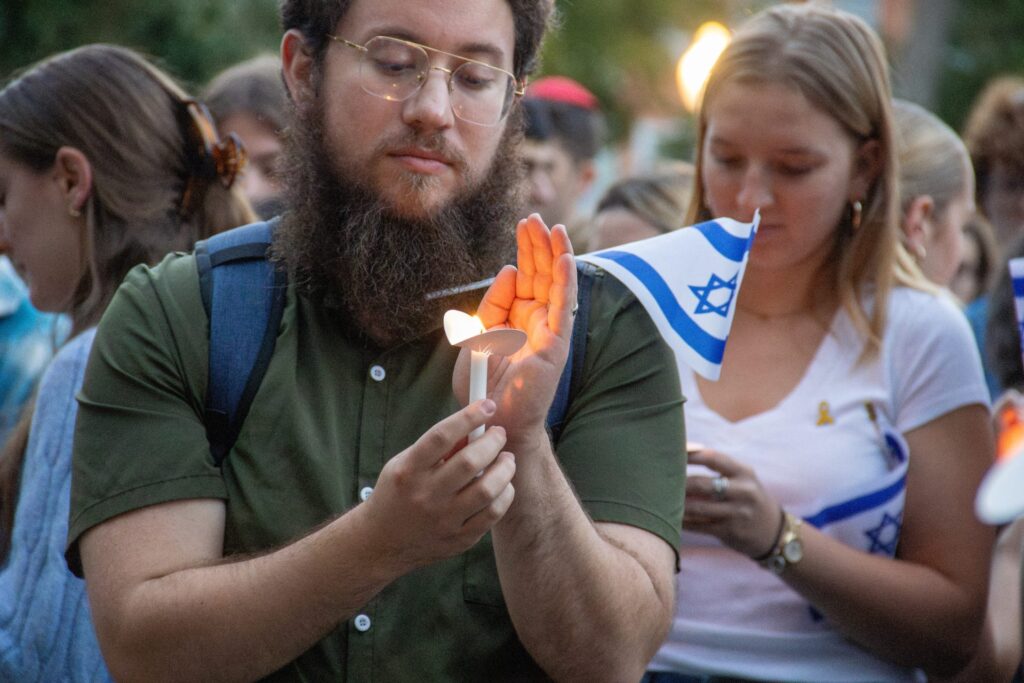 Photo by Connor Martin
Photo by Connor Martin
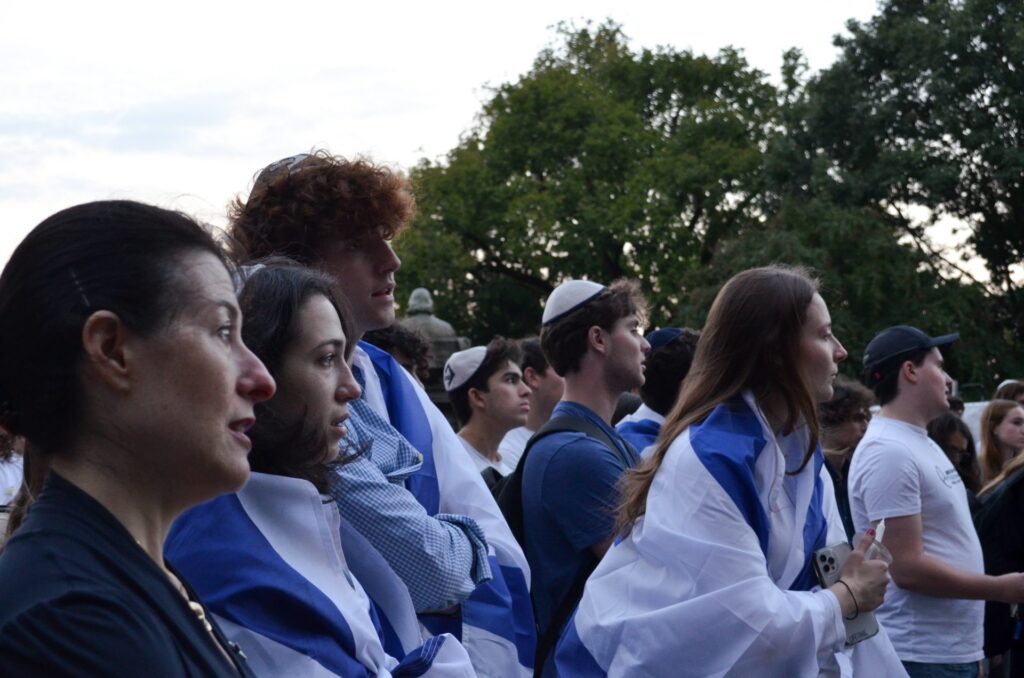 Photo by Sabrina Shaffer
Photo by Sabrina Shaffer
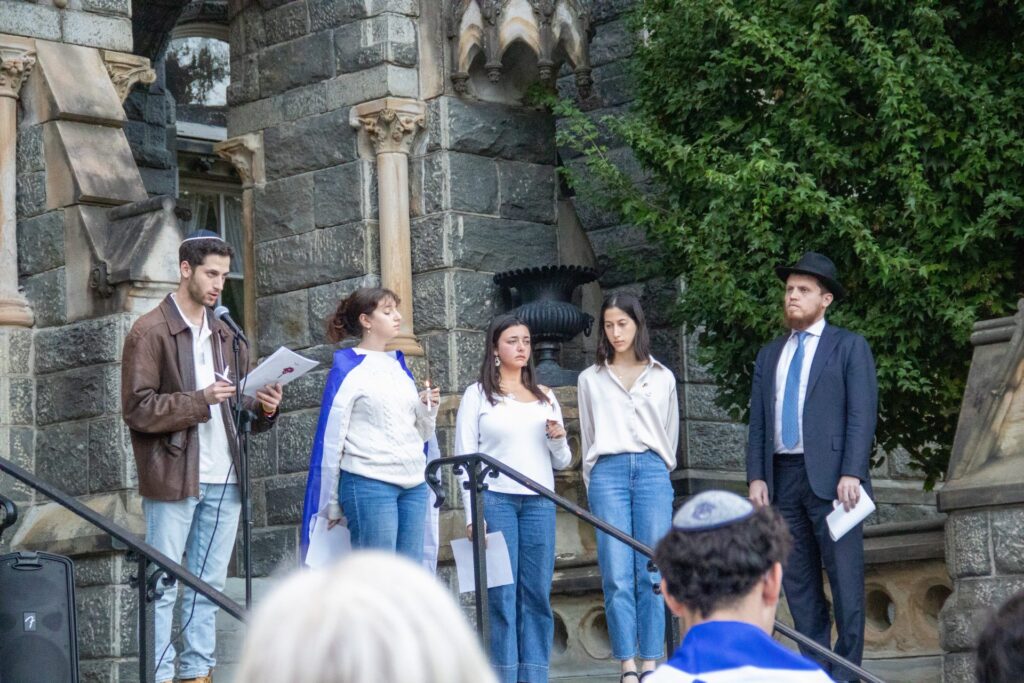 Photo by Connor Martin
Photo by Connor Martin
Editor’s Note: This story was reflected to correct Zamir’s relationship with Ayelet Arnin.


